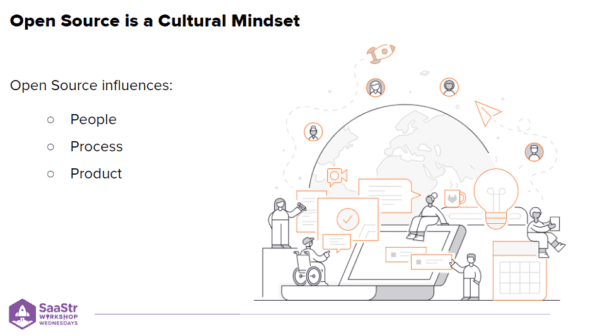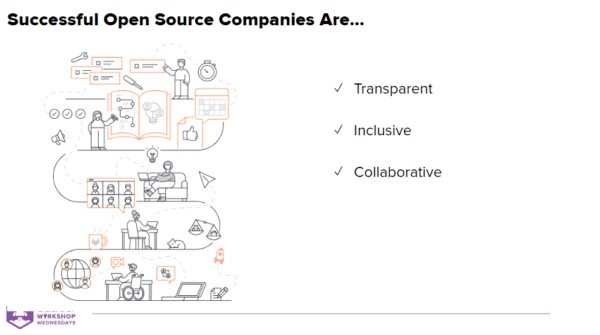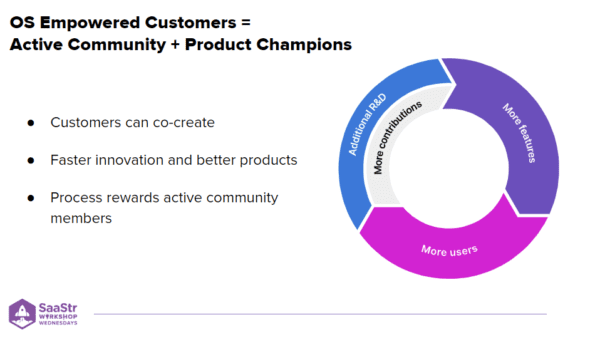Everyone likes the freedom of choice and to feel like they’re part of something, and that’s exactly what Gitlab sets out to do. At its inception in 2011, the goal was to have a place for developers to gather and collaborate together. What it’s turned into is an active community with an “open-source mindset.”
In this week’s Workshop Wednesday, CMO and CSO at Gitlab, Ashley Kramer, dives deep into one of the best marketing assets a company can have, and that’s open-source communities.
Open-Source Is A Cultural Mindset
Kramer shares how open-source is part of everything Gitlab does, how it operates, builds relationships within and outside the company, and shows up in its products.
Open source profoundly influences people, processes, and products, and Gitlab represents this strong value system with the acronym C.R.E.D.I.T. — Collaboration, Results, Efficiency, Diversity, Inclusion, and Transparency — that all companies could learn and benefit from.
While the first five ideas are essential for an open-source mindset, the final one, transparency, is a requirement for all of the others to co-exist.

Transparency Unites Everyone
On the people side of things, transparency is a must when collaborating with others because everyone needs to be united around a single project or concept or whatever it is.
To best utilize an open-source community, you must ensure the people you bring on deeply align with your values.
And then there are processes. How do you make processes clear? By using a public-first mentality, regardless of whether you’re an open-source or closed company. For example, Gitlab uses a public handbook with thousands of pages of strategies and marketing and sales operations. Of course, when the company went public, some things had to go internal, but everything they do begins with a public-first mentality.
An environment of transparency and an open-source mindset is beneficial outside just products. With processes at the fingertips of anyone who cares to learn about them, you can build your own business, but you can also help others, even in how they operate their companies.
Stay Ahead of the Competition with Open Source
The most obvious benefit of an open-source mindset is the open-source product, or as Gitlab calls it, an open-core product.
Kramer says, “What an awesome way to innovate faster and stay ahead of the competition than by having engineers build this great platform for enterprises to use across the world and also having an open-source community contributing to it and merging their code with it.”
When you create a community of transparency through an open-source mindset, your customers feel more comfortable investing because they’re part of the team instead of just a paying vendor.
No one wants to work for a company where it feels like a bunch of executives are sitting in a room making decisions for everyone else, so you, as business leaders, can establish these values throughout the company and build something where everyone feels included in the direction and success of the business.
A company that started as your “baby” becomes everyone’s baby.
Everyone is invested emotionally in the success of something because they feel included in it — a powerful psychological tool that any company could use to its advantage, open source or not.

An Active Community Could Be Your Greatest Asset
At the start of the pandemic, offices were closing down, and companies had to pivot to fully remote almost immediately. It took time to find ways to not only transition to creating an inclusive remote environment but also to build an active community.
Since the beginning, Gitlab has been remote, including people from 62 countries. They didn’t face the same panic and showed others how to schedule, record, and engage people across time zones through asynchronous meetings where people could participate from wherever they were in the world.
They paved the way for others to do the same through an open-source mindset focused on people, processes, and products.
And thanks to this methodology, they’ve built an active community of product champions where customers feel empowered.
An active community is the single most important component of this open-source concept.
Customers co-create in real-time, with faster innovation and better products than competitors because everyone is involved within and outside the company. And the way to keep that community active is through rewards.
The open-source community allows customers, whether sitting within an organization or just part of the wider community, to come in and say, “Hey, I understand that you would love this as part of the GitLab platform. I’m just going to contribute that code.”
And those contributors, whether it’s for Gitlab or any company out there, get the feature they want by contributing. For the company, we get to provide that feature to all of the other customers using this platform worldwide.

Gamify The Experience and Watch Your Community Grow
Engaging a community can be difficult because every community needs some give and take. People who constantly give and companies that always take isn’t a sustainable process. So gamifying the experience will encourage your community to participate.
With Gitlab, hackathons are fun. You get contributors certified and rewarded and create an active community that drives value.
And that’s what running a business really comes down to — driving value for the business, its employees, and the consumers.
Staying ahead of innovation and having powerful components to your business, like capability and functionality, is a key differentiator and a great talking point with customers.
From a marketing perspective, with an open-source community, you’ll have a highly impactful and tangible thing to share with customers, especially when you look at your closed-platform competitors and how ahead of the game your product is, thanks to that community.
“Active communities are absolutely, hands-down, my best marketing asset, our best product incubator,” says Kramer.

